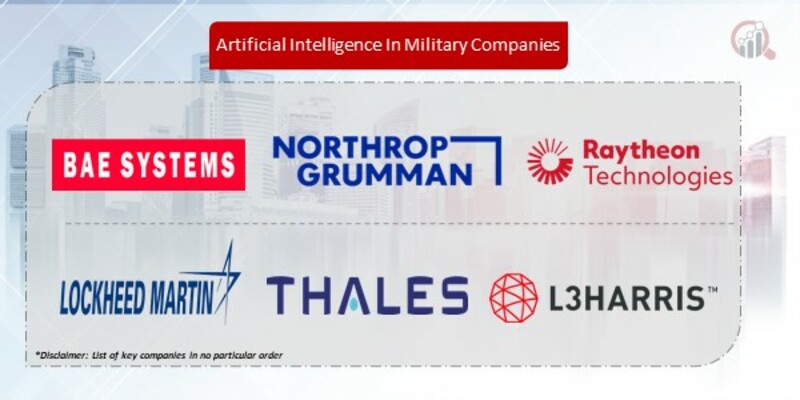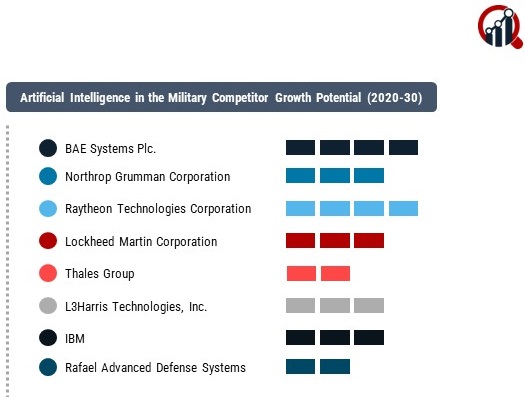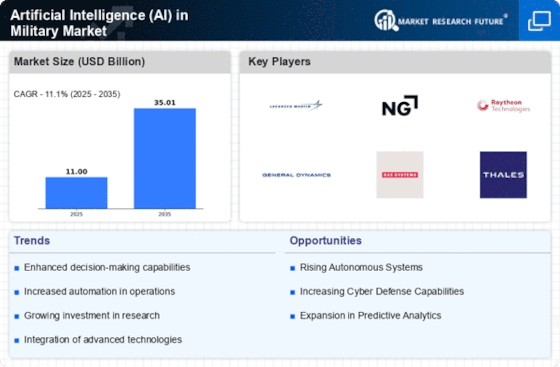Top Industry Leaders in the AI in Military Market

Artificial Intelligence (A.I.) in Military Market Competitive Analysis:mar
BAE Systems Plc. (U.K.)
Northrop Grumman Corporation (U.S.)
Raytheon Technologies Corporation (U.S.)
Lockheed Martin Corporation (U.S.)
Thales Group (U.S.)
L3Harris Technologies, Inc. (U.S.)
IBM (U.S.)
Rafael Advanced Defense Systems (Israel)
Strategies Adopted
Current investment trends in the AI in the Military industry underscore a focus on research and development, technology partnerships, and government contracts. Key players are directing investments towards improving AI capabilities, exploring new applications, and collaborating with military agencies for system integration and testing. Investments in cybersecurity, data privacy, and ethical AI practices are prevalent, reflecting the importance of ensuring the security and integrity of AI systems in military operations. Additionally, strategic investments in AI talent acquisition and training aim to build internal expertise and capabilities to meet the growing demand for AI solutions in the military sector.
The overall competitive scenario in the AI in the Military market is characterized by established defense contractors and innovative technology companies, each navigating the industry with distinct strategies. Market share analysis considers factors such as AI performance, interoperability with existing military systems, and adherence to military standards and regulations. The industry's responsiveness to technological advancements, regulatory requirements, and military priorities further shapes competitiveness. As AI continues to transform military operations and decision-making processes, companies in this sector are striving to balance innovation, reliability, and security to maintain a competitive edge in a dynamic and evolving defense landscape.
Emerging Companies
As the demand for AI solutions in military applications continues to grow, new and emerging companies are entering the market, contributing to innovation and product diversification. Start-ups and specialized firms such as Anduril Industries, Palantir Technologies, C3.ai, and SparkCognition are gaining recognition by providing AI-powered solutions tailored to military requirements, such as intelligence analysis, surveillance, and reconnaissance (ISR), and mission planning. These companies often leverage expertise in data analytics, machine learning, and software development to deliver cutting-edge AI capabilities to military customers. The industry is witnessing a trend towards the development of AI platforms that offer scalability, modularity, and integration with existing military systems, enabling rapid deployment and mission adaptability.
Industry news within the AI in the Military market reflects ongoing trends, regulatory changes, and technological advancements driving the sector forward. News related to successful AI deployments, partnerships for technology integration, and advancements in AI algorithms and models showcase efforts to enhance military readiness and effectiveness. Moreover, developments in AI applications, such as the use of AI for predictive maintenance of military equipment and the integration of AI into command and control systems, are frequently covered in industry news, reflecting the industry's commitment to innovation and operational efficiency.
Recent News
Raytheon Technologies (USA):
Developing AI-powered battlefield awareness systems: Raytheon's BICT (Battlefield Information Collection and Transmission System) uses AI to analyze data from sensors and vehicles, providing real-time situational awareness for soldiers.
Focus on ethical AI development: Raytheon emphasizes responsible AI development with initiatives like its Defense Advanced Research Projects Agency (DARPA) Explainable AI program focusing on explainability and transparency in military AI systems.
General Dynamics Mission Systems (USA):
Upgrading Tactical Ground Stations (TGS) with AI: General Dynamics is integrating AI into their TGS to improve threat detection, decision-making support, and information analysis for military commanders.
Focus on cybersecurity: General Dynamics prioritizes cybersecurity in its AI-powered systems to protect sensitive military data and ensure system integrity.
Collins Aerospace (USA):
Expanding CAHMS (Connected Aircraft Health Monitoring System): Collins Aerospace is applying AI to CAHMS for predictive maintenance of military aircraft and ground vehicles, minimizing downtime and optimizing operational efficiency.
Focus on edge computing: Collins Aerospace utilizes edge computing in their AI systems to enable faster on-site data processing and real-time decision-making at the tactical edge.
Leonardo SpA (Italy):
Developing Athena, a secure military IoT platform: Leonardo's Athena platform uses AI for data analysis and anomaly detection to enhance situational awareness and asset management in battlefield environments.
Focus on interoperability: Leonardo prioritizes ensuring its AI systems seamlessly integrate with existing legacy systems and military communication networks.
Elbit Systems (Israel):
TorpedoNET: Secure underwater network with AI: Elbit Systems' TorpedoNET uses AI to optimize communication and coordination between torpedoes and command centers, enhancing effectiveness in naval warfare.
Focus on miniaturization and ruggedization: Elbit prioritizes developing compact and durable AI systems suitable for harsh military environments.











